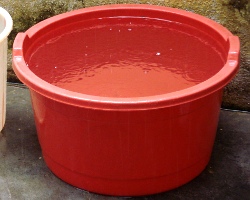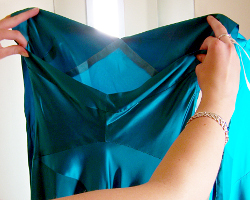How can I reuse or recycle leached wood ash left over from lye making?
 Bee has asked:
Bee has asked:
What can I do with a lot of wood ash after it has been leached? I have a large firepit, and I plan on saving and leaching the ashes… but I’m very leery about tossing that much slag ash onto the compost heap. I’ve found lots of info about ashes before leaching, but practically nothing about after leaching.
Funnily enough, I was riddling our woodburner and thinking about recycling ash just before I spotted this question from Bee :)
We’ve already covered the various different ways to reuse wood ash – from unpainted/unvarnished wood – in the garden and beyond — and one of those ways is to use it to make lye, which is what Bee is talking about here: the wood ash left after it’s been steeped to make lye for soapmaking or what-have-you.
I haven’t made lye myself – we just compost the ash – and like Bee, my Google-fu has failed me. I can find lots of tutorials on how-to make lye from wood ash but they all just skip from making the lye solution to using the lye, without explaining the clean up.
So does anyone know if the leftover ash is suitable for composting? I suspect it would be fine to go on a well-balanced compost heap – when “raw” wood ash is composted, the lye & salts leach away into the compost over time and the resulting compost will be alkaline but not too caustic to burn plants. The leaching process will have removed a lot of the lye so in theory it shouldn’t damage your heap – although equally, there is less point in it being there because it contains less minerals than “raw” wood ash – better than being thrown into landfill but not going to add a lot of goodies to the garden. That’s what I think anyway, from looking at the situation now — I am very happy to be contradicted by someone who has had experience of composting it.
Is there anything else that can be done with it? What would our ancestors – who wasted so very little – have done with it?



 We’ve had an email from Mark:
We’ve had an email from Mark: Bettina has asked:
Bettina has asked: I hope everyone has had a cracking start to 2012. I feel a bit bogged down catching up on everything leftover from 2011 but other than that, it’s been good!
I hope everyone has had a cracking start to 2012. I feel a bit bogged down catching up on everything leftover from 2011 but other than that, it’s been good! It’s so easy to forget about things once they’re tucked away in a cupboard – the scratty tinsel, the old electronic device that’s been replaced, the party dress you won’t probably wear again until next Christmas when it might be outdated or not fit… We’re terrible at putting things on a shelf “just in case” then not only forgetting them but getting blind to the fact they’re unwanted – if we didn’t want them, why have we kept them so long? – or even there (I get to the point where I just look through rather than at clutter around the place).
It’s so easy to forget about things once they’re tucked away in a cupboard – the scratty tinsel, the old electronic device that’s been replaced, the party dress you won’t probably wear again until next Christmas when it might be outdated or not fit… We’re terrible at putting things on a shelf “just in case” then not only forgetting them but getting blind to the fact they’re unwanted – if we didn’t want them, why have we kept them so long? – or even there (I get to the point where I just look through rather than at clutter around the place). This is particularly important for Christmas decorations or other themed items. I know a lot of people who buy their Christmas wrapping paper, cards and novelty gifts in the previous year’s January sales – saves a lot of money. Fresh off the back of Christmas, people remember how expensive it is and think ahead to minimise the issue the following year. By May or June though, last Christmas is a long distant memory and next Christmas is still an eon away – and people will be less interested. Now though, people will stash your spare goodies away along with their own Christmas stash.
This is particularly important for Christmas decorations or other themed items. I know a lot of people who buy their Christmas wrapping paper, cards and novelty gifts in the previous year’s January sales – saves a lot of money. Fresh off the back of Christmas, people remember how expensive it is and think ahead to minimise the issue the following year. By May or June though, last Christmas is a long distant memory and next Christmas is still an eon away – and people will be less interested. Now though, people will stash your spare goodies away along with their own Christmas stash. This is the ultimate reason we pass stuff on – so our items don’t end up in landfill and someone else doesn’t have to buy a brand new product that has been made with brand new resources.
This is the ultimate reason we pass stuff on – so our items don’t end up in landfill and someone else doesn’t have to buy a brand new product that has been made with brand new resources.














